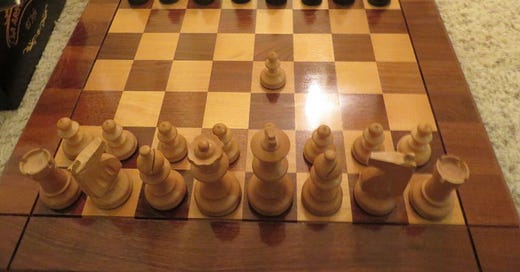The Art of the Chess Club, #3: the Allan Troy Rules. Post #144
Vintage Allan Troy Pinney set, made in India.
Allan Troy once owned the largest private chess business in the Americas, Troy’s Chess Shoppe in Torrance, California. A bon vivant who spoke Spanish fluently, he traveled extensively in Europe and Latin America. The chess set you see here was commissioned by Troy; he rode an elephant into the furthest reaches of the Punjab to order them. Troy played widely too; he was regular in the Mexican national championship, finishing sixth one year. He was also an active officer in the California Chess Association, back in the day when California Chess and USCF were opposite ends of the country—literally.
I started selling books for Troy back in 1983. Today, sadly, I’m selling off his private library on ebay. If you are interested, you can see his collection by typing in “Vintage Allan Troy” into the search engine. Troy used to share his wisdom with me from time to time, including this useful tidbit, “Don’t make Mrs. Troy mad.” Words to live by.
Troy also gave me two priceless rules for chess clubs.
The first is the “Old Man Rule.” Any chess club can survive, Troy said, if there is one old man who puts the pieces away and empties the ashtrays. If he quits, leaves, or is abducted by Martians, the club dies. It dies because no one will do the work. The great error, Troy said, was to leave it all to one volunteer to keep the club running. If you want your club to survive, recruit at least eight volunteers and give them responsibility for at least one night every two months. If you have to pay them a small honorarium, then do so. In fact, that’s a good idea. The money won’t make a difference financially, but it is a token of appreciation.
The second rule is the “Fading Schedule.” Having published the Yetman Brothers’ Descriptive Chess Magazine for nine years, I can tell you from first-hand experience that this rule is ironclad, and will work against you unless you make provisions. It is not something you can improvise on the fly.
Troy’s rule is this: every new chess organization starts out by publishing a magazine, or newsletter, or something. A printer circular of the club, something to keep the club together. After all, everyone likes to see his name in print.
Here is the problem. Mark Twain reports that at the start of the siege of Vicksburg, the inhabitants began a journal of the siege. On the first day, the wrote down seventeen pages. On the second, thirteen pages. On the third, nine pages. This gradually wound down to single paragraphs, and finally a single sentence: “same thing as yesterday.” Chess newsletters have the same problem with creeping ennui. A monthly becomes a bimonthly; a bimonthly becomes a quarterly; a quarterly a biannual; a biannual an annual; the annual becomes a memory.
To keep things fresh you need a diverse staff and you need to rotate. Whatever is going on with your publication, make sure you have tenure of office. Turnover is necessary, not only to keep up a fresh face but to keep the staffers from burning out. Have a fixed date—Labor Day or Valentine’s Day or whatever—and makes sure that on that date there is a shakeup.
And pay them. Nothing burns people out faster than volunteer work.
© copyright 2022 Edward Yetman, III and Eric B. Yetman All Rights Reserved in all formats, print and electronic



